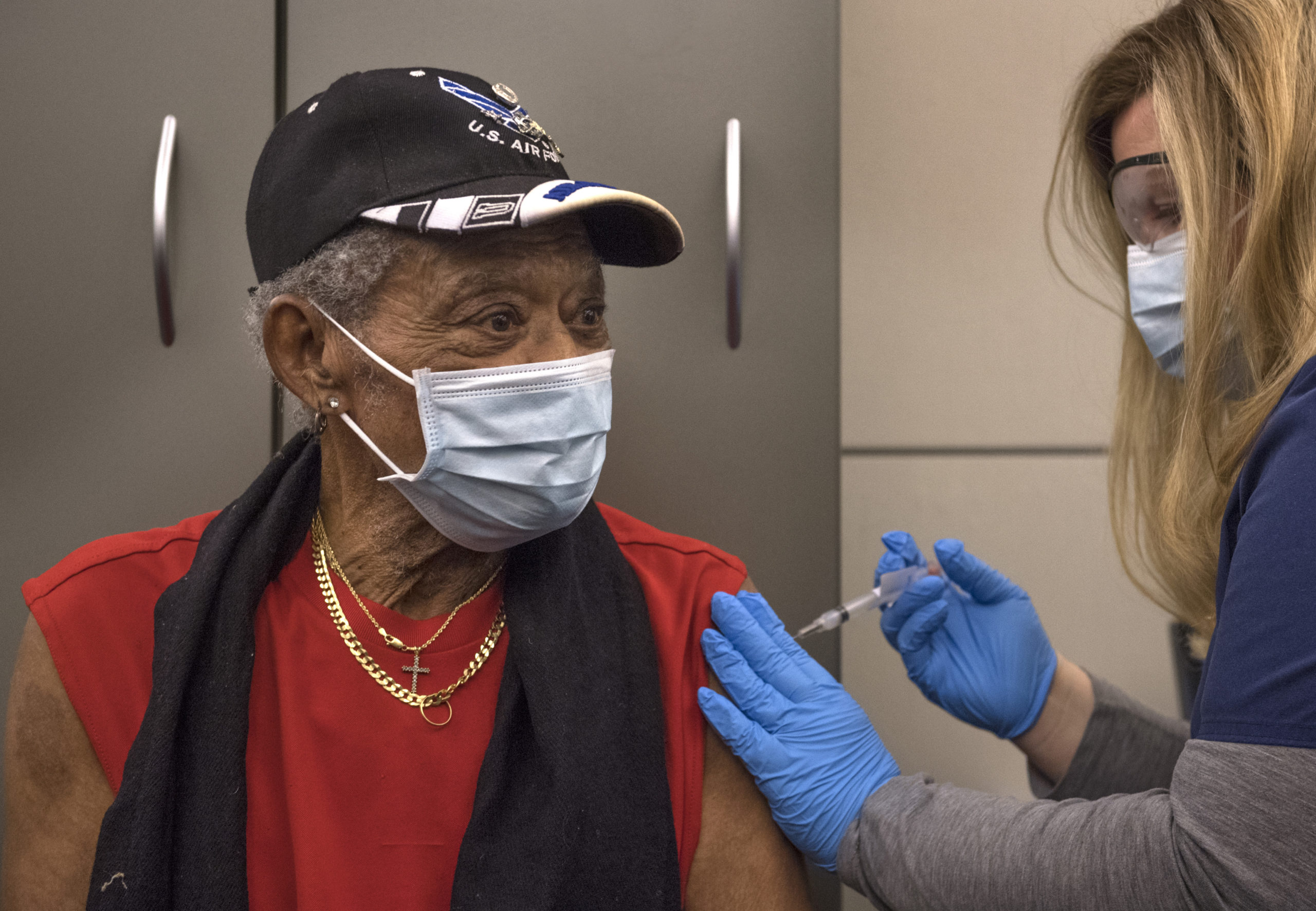Community, COVID-19, Healthier Communities
Spectrum Health collaboration tackles mistrust, supports Black vaccination efforts

Fred Peeples (Chris Clark | Spectrum Health Beat)
Grand Rapids, Mich., Nov. 22, 2021— Spectrum Health is partnering with Michigan State University, Mercy Health, as well as Kent and Muskegon counties to tackle several influential factors affecting COVID-19 vaccination rates in West Michigan Black communities where numbers are low.
“Vulnerability to COVID-19 is impacted by factors like socioeconomic status, disability, racism, language, housing and transportation,” said Jeremy Moore, director of community programs for Spectrum Health’s Healthier Communities. “This initiative focuses on the inequitable outcomes in our Black communities.”
Healthier Communities has received a one-year, $700,000 subaward as part of MSU’s National Network to Innovate for COVID-19 and Adult Vaccine Equity program. The project is funded by a larger $6 million grant awarded to the university from the Centers for Disease Control and Prevention, or CDC. The money looks to improve vaccination rates in West Michigan and Flint, as well as in other cities including Chicago, Baltimore, and areas in North Carolina.
“This project will financially support Black-led efforts that are creating better access to vaccines, tackling mistrust in health care delivery, and helping to answer questions about COVID-19 that the community may have,” Moore said. “Similar efforts in our counties are needed to address other vulnerable populations as well.”
Moore indicated that additional funding could be awarded in coming years based on the outcomes of the first year.
The collaborative work of the CDC National Network grant will focus on supporting community resources and systems within Black communities in Grand Rapids and Muskegon with the understanding that vaccination is just one part of a range of efforts to ensure most of the community gets immunized.
Currently, Grand Rapids has a vaccination rate of 33.74% among African Americans compared to 38.82% in Ottawa county. Muskegon only has a 31.96% vaccination rate. Furthermore, vaccination rates among Black 20-to-29-year-olds are just 12.5% in Muskegon (23.32% in Grand Rapids) compared to 31.14% in Ottawa county.
According to MSU epidemiologist Debra Furr-Holden, PhD, an associate dean for Public Health Integration who is leading the larger CDC grant, the overall goal is to boost confidence in the community by not only finding better ways to gain access and receive care, but to improve literacy and battle misinformation around COVID-19 and other adult vaccines.
To do this, Moore said Spectrum Health and MSU have joined forces with several other health organizations.
“We are building on work that organizations such as the Grand Rapids African American Health Institute have done and working closely to align efforts with the Black Impact Collaborative,” Moore said. “We are also collaborating with Kent County and Mercy Health, all of whom have been working to increase vaccinations across the board.”
To assist with how grant funds are allocated in Grand Rapids and Muskegon, a Black Vaccination Community Resource Committee was created in each city. Comprised of leaders and community representatives, members also provide accountability around the work being done and ensure effective, lasting change happens.
According to Kelsey Perdue, a member of the Grand Rapids committee, two major strategies have been developed that community leaders and committee members believe will help increase Black vaccination rates within the county.
“The first strategy is investing in training and building a network of activities led by Black leaders that will help with disseminating information and increasing vaccination access and scheduling,” she said. “We are providing $400,000 to the Grand Rapids African American Health Institute for this work and investing $65,000 with The Diatribe to develop a community-informed plan that engages Black 18-to-29-year-olds on vaccines and getting vaccinated.”
She added that although these strategies are part of a much larger picture of community vaccination efforts, they are two critical pieces that must be effectively addressed.
“Our goal is to see the long-term Black vaccination rate reach 75% in these areas and ensure residents have the ability to get their questions answered about COVID-19, vaccinations and boosters from community leaders they trust,” Perdue said.
Additional information about this project and other vaccine equity programs across the country can be found here.
###
People are at the heart of everything we do, and the inspiration for our legacy of outstanding outcomes, innovation, strong community partnerships, philanthropy and transparency. Corewell Health is a not-for-profit health system that provides health care and coverage with an exceptional team of 60,000+ dedicated people—including more than 11,500 physicians and advanced practice providers and more than 15,000 nurses providing care and services in 21 hospitals, 300+ outpatient locations and several post-acute facilities—and Priority Health, a provider-sponsored health plan serving more than 1.3 million members. Through experience and collaboration, we are reimagining a better, more equitable model of health and wellness. For more information, visit corewellhealth.org.
Contact:
Sarina Gleason
Media Relations
Phone: 517.256.5618
Email: sarina.gleason@corewellhealth.org

